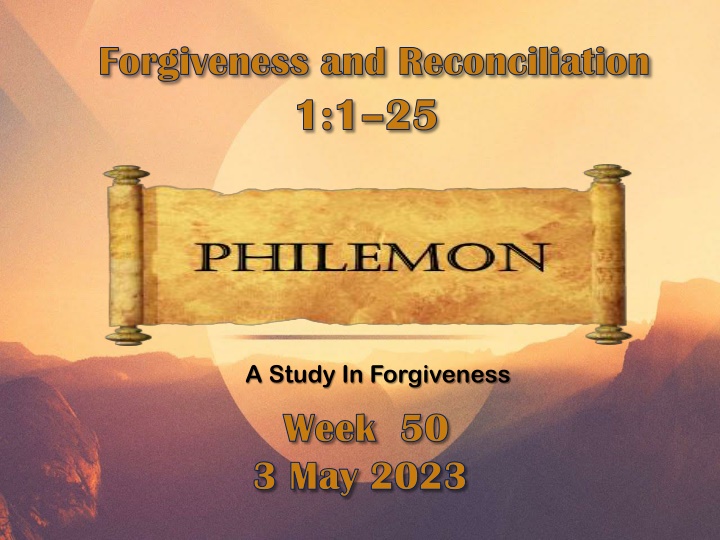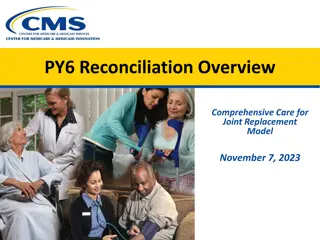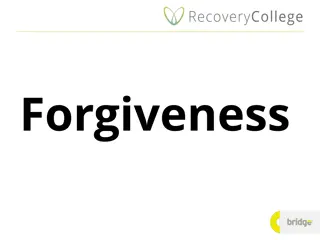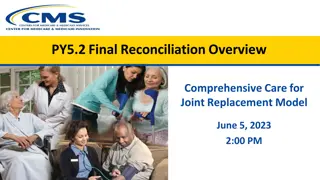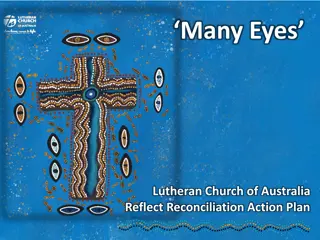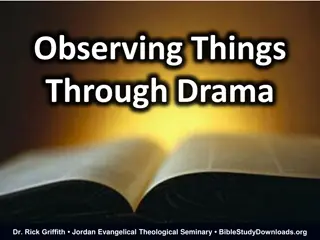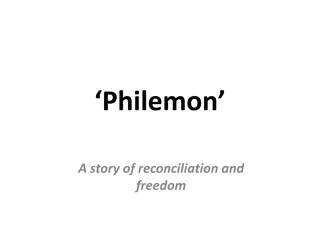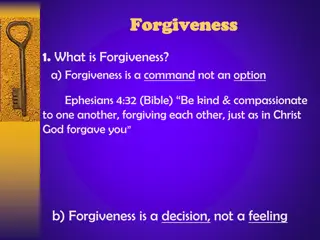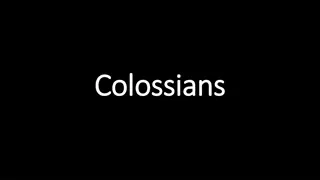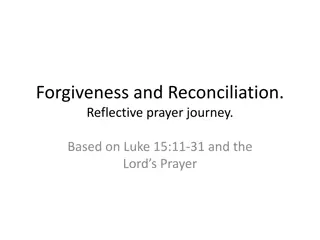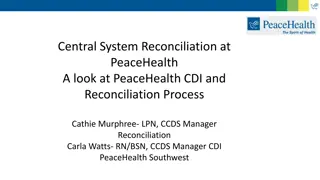Study in Forgiveness and Reconciliation
The Epistle to Philemon, authored by Paul, emphasizes forgiveness and reconciliation in a personal letter addressing the relationship between Philemon and Onesimus. It highlights the power of forgiveness, redemption, and unity in Christ, promoting equality and brotherhood among believers. Through this study, Paul showcases the transformative nature of Christian love and the importance of overcoming social and economic barriers through forgiveness.
Download Presentation

Please find below an Image/Link to download the presentation.
The content on the website is provided AS IS for your information and personal use only. It may not be sold, licensed, or shared on other websites without obtaining consent from the author.If you encounter any issues during the download, it is possible that the publisher has removed the file from their server.
You are allowed to download the files provided on this website for personal or commercial use, subject to the condition that they are used lawfully. All files are the property of their respective owners.
The content on the website is provided AS IS for your information and personal use only. It may not be sold, licensed, or shared on other websites without obtaining consent from the author.
E N D
Presentation Transcript
Forgiveness and Reconciliation Forgiveness and Reconciliation 1:1 1:1 25 25 A Study In Forgiveness Week Week 50 3 May 3 May 2023 50 2023
PHILEMON INTRODUCTION AUTHOR: The Epistle to Philemon was written by the apostle Paul while he was under house arrest in Rome. TIME AND PLACE OF WRITING: Philemon is one of the four prison epistles written between 60-62 AD. It is a personal letter from Paul to Philemon a member of the church at Colossae which met in his house, it is also addressed to Apphia, Philemon s wife, and Archippus, his son (v2). KEY VERSES: Philemon 1:16-17 No longer as a slave but more than a slave, a beloved brother, especially to me but how much more to you, both in the flesh and in the Lord. If then you count me as a partner, receive him as you would me.
PHILEMON INTRODUCTION PURPOSE OF THE EPISTLE:Paul s primary objective is to reconcile the relationship between Philemon and Onesimus and to show the implications of the gospel on the issue of slavery. So, he writes this letter asking Philemon to receive Onesimus, his runaway slave, back as a brother in Christ and not as a slave. In the letter, Paul emphasizes the Christian virtue of forgiveness and the power of the gospel to break down social barriers and promote equality among all believers.
PHILEMON INTRODUCTION THEME OF EPISTLE: Forgiveness and Reconciliation. of both forgivenessandreconciliation. He starts by reminding Philemon that he and Onesimus are brothers in Christ, how that relationship should take precedence over any social or economic difference. Through out the letter Paul emphasizes the magnitude The letter stresses the idea that forgiveness is the key attribute of Christian love and it is necessary for the health and unity of the church. Additionally it teaches us that because of the power of redemptionandtransformation in Christ, our social and economic differences should not divide us, and that we should strive to see one another as brothers in Christ.
PHILEMON OVERVIEW A Study In Forgiveness ! Swindoll calls this letter A Personal Postcard addressed primarily to a Christian in the Church at Colossae named Philemon. He make it a point to say that this letter was composed and sent at the same time as the letters to Churches in Colossae and Ephesus. Though the letter is brief consisting of just twenty-five verses, it contains a powerful study in forgiveness. In it, Paul presents a warm appeal to Philemon, a slave owner, to accept back into his household his runaway slave Onesimus.
PHILEMON OVERVIEW Who had become a Christian under Paul s preaching and is now repentant and ready to return. In this appeal Paul, as Christ does for every Christian, acts as an advocate for Onesimus before Philemon. Although the institution of slavery in antiquity is not fully addressed in this scripture, Paul appeals to Philemon for the forgiveness and freedom of Onesimus. Swindoll points out that Paul could have flexed his apostolic authority and demanded that Philemon receive Onesimus, show him forgiveness, cancel his debt, and send him back to Paul to serve him in ministry.
PHILEMON OVERVIEW Instead, Paul kindly and gently asks Philemon to make the right choice by his own free will. In fact, Paul offers to repay all of Onesimus debt himself. As we will see, this letter to Philemon has great practical value to us today, in that it illustrates for us: The reality and importance of second chances. The equality that believers have in Christ. The power of the gospel to transcend cultural and social boundaries.
PHILEMON OVERVIEW Paul s postcard to Philemon gives us a glimpse of the early church working out how to live the gospel in the midst of an unredeemed culture. It gives us an example of how we have been forgiven, and how we should treat and forgive one another. It reminds us of the profoundly Christ-centered concepts of freedom, forgiveness, mercy and grace . . . especially grace in forgiveness. Warm greeting (1:1-3). Preparation of the appeal (1:4-7). The appeal to Philemon (1:8-16). Encouragement for the appeal (1:17-21). Benediction (1:22-25).
PHILEMON 1:1-3 1Paul, a prisoner of Christ Jesus, and Timothy our brother, To Philemon our beloved friend and fellow laborer,2to the beloved Apphia, Archippus our fellow soldier, and to the church in your house: 3Grace to you and peace from God our Father and the Lord Jesus Christ.
PHILEMON 1:1-3 A warm greeting! In Philemon 1:1 3, Paul s warm greeting reveals some important things about the recipient of Paul s request on behalf of Onesimus. First Philemon is not simply a member of the body of Christ, Paul says he is a beloved brother and fellow worker. Suggesting that he holds an official leadership role in the church at Colossae. He also refers to the church in your [his] house (1:2-3). Second Paul s words suggest he had a prior personal relationship with Philemon and his family. He calls him beloved brother and he greets Apphia our sister, and Archippus our fellow soldier, likely Philemon s wife and his son. Paul s tone here implies that he knew Philemon well.
PHILEMON 1:1-3 Third While this letter is addressed specifically to Philemon, Paul also extends greetings and (the letter) to his family and the church (1:2). By broadening his audience to all the believers in Colossae, Paul subtly communicates that even though the matter of Onesimus fate is a personal matter to be handled by Philemon. He is implying that the final decision cannot be separated from the accountability of the family and the church, both of which would be impacted by whatever decision Philemon makes.
PHILEMON 1:4-7 4I thank my God, making mention of you always in my prayers,5hearing of your love and faith which you have toward the Lord Jesus and toward all the saints,6that the sharing of your faith may become effective by the acknowledgment of every good thing which is in you in Christ Jesus. 7For we have great joy and consolation in your love, because the hearts of the saints have been refreshed by you, brother.
PHILEMON 1:4-7 Preparation of the Appeal! Before getting into the delicate matter of what to do about Onesimus, Paul commends Philemon. He tells him he regularly thanks God for him in prayer (1:4). He commends him for his faith in Christ and love for the saints (1:5). He prays that his faith would grow in its effectiveness (1:6). He rejoices in the encouragement that has come from his fruitful ministry among the saint at Colossae (1:7).
PHILEMON 1:4-7 Paul isn t flattering Philemon to soften him up for his appeal on behave of Onesimus. Paul is serious about his high regard for his friend. Paul knows Philemon and Paul considers his reputation praiseworthy. Being well acquainted with Philemon s ministry of love, faith, fellowship, knowledge, goodness, joy, comfort, and refreshment. Whatever hard feelings Philemon may understandably have toward Onesimus and whatever legal right he might have to condemn him Paul s words of commendation reminded Philemon of his true Christian character of graceandmercy (James 2:13).
PHILEMON 1:8-13 8Therefore, though I might be very bold in Christ to command you what is fitting,9yet for love s sake I rather appeal to you being such a one as Paul, the aged, and now also a prisoner of Jesus Christ 10I appeal to you for my son Onesimus, whom I have begotten while in my chains, 11who once was unprofitable to you, but now is profitable to you and to me. 12I am sending him back. You therefore receive him, that is, my own heart 13whom I wished to keep with me, that on your behalf he might minister to me in my chains for the gospel.
PHILEMON 1:8-13 The Appeal! Now, in 1:8, Paul pivots to his main purpose with the use of the word therefore, meant to connect what he previously said with what his is about to say. Look at what he says In light of your Christlike character, Philemon, I want to ask something of you. Though as an apostle, Paul could pull rank on Philemon, he instead appeals to him from a position of humility (1:8-9). Swindollsays He doesn t come with Thus saith St. Paul the Apostle, handpicked by the Lord Jesus Christ, recipient of visions, author of inspired Scripture! Rather he refers to himself as Paul, the aged, and now also a prisoner of Jesus Christ (1:9).
PHILEMON 1:8-13 Paul doesn t order Philemon to obey, but instead he appeals to him twice using the Greek word parakal , a word of gentle encouragement (1:9-10). It s here in 1:10, that Paul first mentions the content of his request . . . In the original text, the verse would have read I appeal to you on behalf of my child, whom I begat during my imprisonment Onesimus. Perhaps that name caused Philemon pause and make sure it read Onesimus. Philemon may have been rightfully perplexed by this sentence.
PHILEMON 1:8-13 The Onesimus Philemon knew was useless, an outlawed runaway slave who probably stole money or property from Philemon before he fled. What could make Paul intercede on behalf of a thief and a fugitive? Paul does acknowledges that Onesimus had been useless to Philemon but something had changed he is now useful both to you and to me (1:11). The name Onesimus literally means useful. Onesimus obviously had not lived up to the meaning of his name. The slave named Useful had been nothing but trouble until the Lord Jesus got ahold of his heart and transformed his life.
PHILEMON 1:8-13 Can you picture Philemon as he reads how Paul described the new and improved Onesimus. Not only was he now useful (1:11), he was a born-again child in the faith (1:10). He was Paul s very heart (1:12), whom Paul had become so fond of he wished to keep him in Rome to continue ministering for the gospel (1:13).
PHILEMON 1:14-16 14But without your consent I wanted to do nothing, that your good deed might not be by compulsion, as it were, but voluntary. 15For perhaps he departed for a while for this purpose, that you might receive him forever, 16no longer as a slave but more than a slave a beloved brother, especially to me but how much more to you, both in the flesh and in the Lord.
PHILEMON 1:14-16 The Appeal! Paul suggested that Onesimus no longer be regarded as just a slave, but more than a slave, a beloved brother to both Paul and Philemon (1:16). In fact Paul floated the idea that maybe it had all been part of God s sovereign plan that Onesimus ran away for a short time now Philemon could have him back forever as a brother in Christ who would be a co-heir of eternal life (1:15). Paul s point here was clear: The Onesimus standing before Philemon, his family, and the church in Colossae was not the same young man who had run away.
PHILEMON 1:14-16 He is a new creation Onesimus had been saved by the grace and mercy of our Lord Jesus Christ. He had proven himself a faithful, devoted minister of the gospel with Paul in Rome. Now! Philemon, who had also experienced the same forgiveness and freedom from our Lord Jesus Christ, could understand the great principle found in 2Cor. 5:17: Therefore if anyone is in Christ he is a new creation, old things have passed away, behold all things have become new.
PHILEMON 1:17-21 17If then you count me as a partner, receive him as you would me. 18But if he has wronged you or owes anything, put that on my account. 19I, Paul, am writing with my own hand. I will repay not to mention to you that you owe me even your own self besides. 20Yes, brother, let me have joy from you in the Lord; refresh my heart in the Lord. 21Having confidence in your obedience, I write to you, knowing that you will do even more than I say.
PHILEMON 1:17-21 Encouragement for the appeal! Having explained to Philemon the transformation Onesimus had experienced, Paul now encourages him to grant Onesimus not only forgiveness but also freedom. Suggesting it would be proper for Philemon to extend forgiveness to Onesimus. Since it is a fundamental principle of brotherly love to be kind to one another, tender-hearted, forgiving each other, just as God in Christ also has forgiven you (Eph. 4:32). Paul expects Philemon to extend full and complete forgiveness to his runaway slave. He expects Philemon to accept Onesimus as he would Paul as a beloved brother in Christ (1:16-17).
PHILEMON 1:17-21 Forgiveness is expected but what about freedom? Swindollsays that would go above and beyond Philemon s obligation, which may be why Paul doesn t actually outright ask Philemon to free Onesimus. While Philemon was under no obligation to free Onesimus Paul hoped he would read between the lines: Onesimus had been useful to Paul for ministry (1:11, 13). Paul regarded him as his very heart and a beloved brother (1:12, 16). Paul wanted to keep Onesimus with him (1:13).
PHILEMON 1:17-21 Paul needed Philemon s consent to keep him (1:14). Paul wanted Philemon to do this out of his own free will (1:14). Paul was willing to pay back anything Onesimus might have cost Philemon (1:18-19). Paul reminded Philemon that he owed Paul his own self (1:19). Paul ask that he would benefit from Philemon in the Lord (1:20). Paul expected Philemon would do even more than he ask (1:21).
PHILEMON 1:17-21 In 1:20, Paul uses a clever play on words, when he says let me have joy (on n mi) from you in the Lord. This word has he same root as the name Onesimus it means to be profitable or useful. The message behind this pun may be Philemon Let me have Onesimus the beneficial one in the Lord. If Philemon wasn t reading between the lines, perhaps Apphia, his wife or his fellow worker Archippus would have helped him realize the magnitude of Paul s request. If not perhaps one of the church members would have said Philemon, I wonder if Paul would like you to send Onesimus back to minister with him. That would be a pretty nice think to do, don t you think?
PHILEMON 1:17-21 Swindoll suggest two things assures him that Philemon forgave Onesimus, accepted him as a brother in Christ, freed him from slavery, canceled his debt, and perhaps even paid for his return trip to the apostle Paul. First We have the book of Philemon in the canon of Scripture. He says I suspect if Philemon had balked at Paul s request and decided to double down on his rejection of Onesimus as useless, this letter probably would not have been preserved and copied far and wide. Second If the Onesimus serving as bishop of Ephesus around AD110 was the same Onesimus as in the letter to Philemon, it s likely that he was granted his freedom from bond-service to Philemon to become a lifelong bond-servant of Jesus Christ.
PHILEMON 1:17-21 Philemon wasn t obligated to cancel Onesimus debt or to free him from service (1Cor. 7:21-24). But he was obligated to forgive him as a brother in Christ. Our conversion to Christ doesn t mean all our financial debts or contractual obligations are suspended. Paul acknowledged this when he promised to pay whatever financial loss Philemon incurred because of Onesimus (1:18-19). Moved by Paul s passionate plea on behalf of the once useless-turned-useful Onesimus, Philemon probably wrote across his former slave s tally of wrongs, PAID IN FULL just as Christ had done for him years earlier.
PHILEMON 1:22-25 22But, meanwhile, also prepare a guest room for me, for I trust that through your prayers I shall be granted to you. 23Epaphras, my fellow prisoner in Christ Jesus, greets you,24as do Mark, Aristarchus, Demas, Luke, my fellow laborers. 25The grace of our Lord Jesus Christ be with your spirit. Amen.
PHILEMON 1:22-25 Final Greeting and Benediction! In Paul s closing remarks, he expresses hope that he will be released in answer to their prayers. He promises, when he is released to visit Philemon and the Church in Colossae. In fact, Paul is so confident in his deliverance from bondage in Rome that he tells Philemon, prepare a guest room for me (1:22). What Optimism! Besides instilling hope that Philemon would likely be seeing his old friend Paul soon, this statement may also have put some pressure on Philemon to make a favorable decision regarding Onesimus.
PHILEMON 1:22-25 Had Philemon expected Paul to be in prison for a few more years, it may have been easier for him to drag his feet and get a few more years of service out the runaway slave to help settle his account. But the prospect of Paul arriving in Colossae in months, even if it was just a prospect, could have encouraged a more timely decision to do what is proper (1:8). Prior to Paul s formal blessing of grace for Philemon, this short letter ends with greetings from Epaphras, Mark, Aristarchus, Demas and Luke (1:23-24) fellow labors also mentioned at the end of Colossians (Col. 4:10-14).
PHILEMON 1:22-25 Not only were there faithful witnesses to the handling of the matter of Onesimus in Colossae, but there was also a sizable circle of saints with Paul in Rome who knew Onesimus and would be eager to learn of Philemon s decision on the matter. There is nothing like a little loving accountability to urge a believer to do even more that what is required (1:21).
APPLICATIONS OF THE LESSON Finding Forgiveness and Freedom in Philemon
APPLICATION FORGIVENESS AND FREEDOM This letter to Philemon contains a powerful example of Christlike selfless intercession on behalf of another. It also provides a grand testimony of the transforming power of God s grace in the life of a redeemed sinner; and it offers these fivecomparisonsbetween Philemon s themes and our own salvation. Every Christian was once a fugitive. Our guilt was great and our penalty was severe. Grace grants us a stay of judgment and the intercession of an Advocate. Our debt has been paid in full by Christ. Our rightful Owner accepts us back and adopts us into His family.
APPLICATION FORGIVENESS AND FREEDOM First Every Christian was once a fugitive. Like Onesimus, we were cowering from God s law and trying to outrun the consequences of our actions. Scripture says that all have sinned and fall short of the glory of God (Rom. 3:23). And like Onesimus, we can t escape the fact of our own enslavement to sin and death. Second Our guilt was great and our penalty was severe. Romans 6:23 says, the wages of sin is death. Had Onesimus been left without grace and mercy, he would have been subject to possible punishment by death. In fact, it was just what he deserved under the law. The same is true for all of us. The penalty for our own sin against God was severe and our guilt weighted heavily.
APPLICATION FORGIVENESS AND FREEDOM Third Grace grants us a stay of judgment and the intercession of an Advocate. Had Philemon chosen to give Onesimus what he deserved, it would have been death. But instead he chose grace. He chose forgiveness. He chose freedom. The grace of God for each of us accomplishes the same. Our judgment has been set aside, and we now have a mediator also between God and men, the man Christ Jesus (1Tim. 2:5). Fourth Our debt has been paid in full by Christ. Just as Paul offered to step up to the bar of judgment to pay for Onesimus crime and purchase his freedom, the Lord Jesus Christ took all of our sin, shame, and guilt upon Himself and paid for it on the cross at Calvary (Isa. 53:5-6).
APPLICATION FORGIVENESS AND FREEDOM Five Our rightful Owner accepts us back and adopts us into His family. Now, we have a new relationship with our God and Creator. Though we were once in a relationship of enmity with God and subject to His just wrath, we have been forgiven and cleansed by the blood of Christ. In Romans 6:23, Paul tells us, the free gift of God is eternal life in Christ Jesus our Lord. And again in Romans 5:10 he says, If while we were enemies we were reconciled to God through the death of His son, much more, having been reconciled, we shall be saved by His life.
APPLICATION FORGIVENESS AND FREEDOM In closing Swindoll shares: As a result of this letter to Philemon, I have a whole new appreciation for my forgiveness, freedom, and fellowship in the family of God. It reminds me that we were all untrustworthy fugitives, every one of us. And like Onesimus, I was recused by the good news of Jesus Christ, and it resulted in an end to my running, the complete forgiveness of my debt, and my adoption into the family of God. There are still twokinds of slaves reading this letter. First are those who have stopped running and have found rest, refreshment and a new life in Christ.
APPLICATION FORGIVENESS AND FREEDOM Second are those who are still running running from God, running from the horrible consequences of sin, and running from the forgiveness and freedom available right now. My hope is that the grace of our Lord Jesus Christ will emancipate all the runaway slaves who are reading this letter. And to those who have been freed: My prayer is that you will be useful to the Master who paid the price for your redemption and that you will be willing to submit yourself to Him as a bond-servant.
NEXT CLASS 10 May 2023 Before next class, read the below chapters in Before next class, read the below chapters in the NKJV and in one other versions of the Bible, the NKJV and in one other versions of the Bible, i.e., KJV, NRSV, NIV, CEV, etc i.e., KJV, NRSV, NIV, CEV, etc Chapter 1:1 9 Opening Greeting and Prayer
